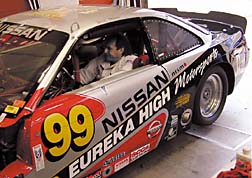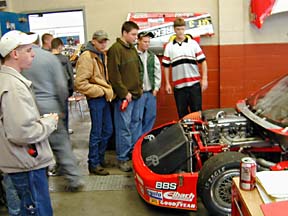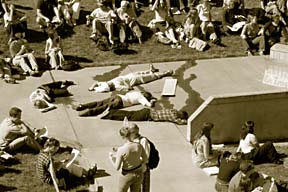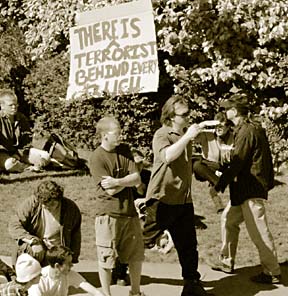|
Oct. 10, 2002 Fast times at Eureka Highstory & photos by ANDREW EDWARDS
Last month, Hansen drove the car, designed by Grable and Hansen and built from the ground up by students, to a second-place finish in the Valvoline Runoffs in Lexington, Ohio -- widely recognized as the Olympics of American road racing. "We all didn't expect him to do as good as he did," said Eureka High junior Ryan Murphy, who, along with fellow students Zach Hoover and Shawn Pulver, went along as crew for the event. "He really amazed us." Given his qualification times, Hansen started the race in sixth place. But he worked his way up, and at one point took the lead. Then the engine started to seize up due to an oil leak. That, Hansen believes, cost him the victory. Even so, a podium finish was overpoweringly unexpected. "We were crying; I could barely talk. It was very emotional for all of us," Hansen recalled last Friday while he and his team were preparing the car for another race that weekend at Sonoma County's Sears Point Raceway (Tire trouble hampered Hansen, who placed fourth.)
The organization also named Grable, a veteran machinist, "mechanic of the year." "It's hard to describe the excitement," Grable said. "From where we started: built it from scratch and [then to] go on to the national runoffs [against the] fastest cars in the nation is amazing." Winning is nothing new for Hansen and Eureka High Motorsports, as the racing team is called. They've finished consistently in the top five in the GT-3 division, which includes all of the larger four-cylinder cars like the 240 SX, for the past 10 years. They've built three other cars, all of which still race in SCCA events (two of those were also in the Ohio race). But this was the team's first time at the event, and Hansen's first time ever driving the race. "To finish second the first year, [people] really went `wow, that high school group is for real,'" Hansen said, smiling. Hansen started the program in 1984 with his team-teaching partner Dick Brown, now retired. He predicted -- accurately -- that it would boost enrollment in auto-shop classes. He also argued -- again accurately -- that it would be a lot of fun to actually build a sports car and race it as a school project. So they got funds together and, with Grable assisting, had the students design and build the first car. That was back in the 1980s. Except for the engine block, the cylinders and the fiberglass shell, nothing on that car was stock. The same would be true of the next three cars they would build, including the one that Hansen drove in the runoffs. Each one cost about $100,000 to build and was assembled by hand over three to six months. The latest car, built four years ago, will soon be sold -- the proceeds will be used to build a new car beginning next year. The experience of maintaining and building a race car can be invaluable on many levels, Hansen and Grable said. "It's an alternative to any number of things, drugs (for instance). It occupies their free time and gives them a lot of skills," Hansen said. Grable agreed. "If they pay attention, when they walk out of here they could build one of these," Grable said, pointing at the car. "From building it, to running it, and tuning it, they probably know as much as I do about it." Students in the program have a higher graduation rate than the school at large. "I don't know of a single one who hasn't graduated," said Principal Bob Embertson. Many of the students have gone on to careers in the automotive industry. One of them even crewed for champion racer Dale Earnhardt for two years. Locally, a slew of individuals and businesses help out with the program including McCray Nissan, Masterson's Communications, which donates radio gear, and Humboldt Integrated Waste Management, which supplies motor oil. Another huge help is Hansen's wife, Lori, who organizes all of the team's trips. The trip to Ohio cost about $16,000, which the group earned doing fund-raisers ranging from landscaping to fixing up and selling a donated `55 Thunderbird. The trip took just over a week, during which time all of the students were required to do their homework, Hansen said. Still, there was time to check out local attractions such as the rock `n' roll and the pro football halls of fame. At the end of the day, according to all involved, it was an amazing experience, and they're looking for a repeat. "(We) Might start doing nationals (all the time) now," Hansen said. "It was a lot of fun and we'd like to go back. It's right where we'd like to be." The GT-3 national championships will be aired on Dec. 8 at 10 a.m. on SpeedTV. The race in Blue Lakeby ANDREW EDWARDS Blue Lake has always been a town of opposites -- clowns and loggers. And yet as the city council race heats up in this topsy-turvy hamlet of 1,300, the same two things are on everyone's mind: the casino and annexation. So much for discussion of a wide range of issues. Nevertheless, there's no shortage of candidates competing for the two council seats that are up for grabs (each Blue Lake voter gets to mark two names on the ballot). JEAN LYNCH Lynch, 52, is a bookkeeper who has lived off and on in Blue Lake since 1964. Her primary reason for running is to assist with the disaster planning that the council has already begun. Other goals include maintaining Blue Lake's small town feel, fixing up the seating in Prasch Park and forming a neighborhood watch program to assist the understaffed police department. Lynch is undecided on annexation and is waiting for more information to make up her mind. Politically, Lynch describes herself as "correct," but generally in favor of "smaller government with more people involved." ALEXANDER RICCA Ricca, 61, a self-described political independent, is a homemaker who has lived in Blue Lake for 22 years. A current councilmember, Ricca is controversial. His competitors are doing their best to remind voters of Ricca's longstanding conflict with Blue Lake City Manager Duane Rigge, who fired him from his position as Blue Lake's park supervisor in 1997. Ricca is unapologetic about his strained relationship with Rigge. "I have been a very severe critic of the Blue Lake city manager since my first term on the council," said Ricca, who was elected to the council after his firing. "I'm trying to offer alternatives to policies and procedures that have led to the perception that city hall does not represent the citizens of this community." If re-elected, his first priority would be to eliminate a budget deficit, improve park facilities and increase the council's control over the city's budget (he thinks too much budgetary authority is wielded by Rigge). He favors letting people living in areas slated for annexation decide whether or not they want to be within the city's jurisdiction. SHERMAN SCHAPIRO Schapiro, 55, is an ex-aerospace engineer turned tax consultant. A 20-year resident of Blue Lake, he has served on the council for the past 12 years. Schapiro said he wants to stay on the council for three reasons: to increase contact between the Blue Lake Police Department and the community at large; to find ways to encourage economic development in the downtown and industrial park; and to follow through on the goals identified in the citywide "visioning" process. He is in favor of annexation, which he says would allow for needed growth and more affordable housing. A registered Democrat, Schapiro believes politics isn't what's at issue in city government; representation is. "I have no personal agenda or personal ideology," Schapiro said. "I try to look at all sides of the issue and make the correct decision." MARLENE SMITH Smith, 53, is an acupuncturist. She moved to Blue Lake five years ago from San Francisco. What attracted her to the community, she said, was its small town feel. Along with better communications with Blue Lake Rancheria, her main goal on the council would be to maintain that small-town atmosphere through managed growth. She says annexation is a part of that because it ensures that the city maintains control of development, rather than the county. A Democrat and a small business owner, she said she would bring unique skills to the council. "I know what it takes to run a small business, and that's basically what a small city like Blue Lake is," Smith said. CHRIS WOODY Woody, 43, is a security officer at the Blue Lake Casino. He has lived in Blue Lake for 24 years. Born and raised in Humboldt County, Woody considers himself a vote for change. Among the changes he says need to be made: improve relations with the rancheria; maintain the police force; reduce squabbling between the council and city staff (a reference to Ricca); and attract more tourists to Blue Lake. He said that both his children were raised in Blue Lake and stressed his attachment to the community across ideological boundaries. "The thing about being a council person is that you have to support the views of the citizens as long as they have merit," Woody said. "You need to make sure you represent your constituents." He sees the community's relationship with the casino as mutually dependent and hopes to establish a healthy long-term relationship with the rancheria government. Regarding his employment with the casino, he said it was no different than other council members who might have conflicts of interest. He said he would simply recuse himself if asked to vote on something that would affect the casino. Thompson
opposes Bush war powers resolution by BOB DORAN THE REPUBLICAN-DOMINATED U.S. HOUSE OF Representatives is certain to hand President Bush broad powers to wage war against Iraq in a vote set for Thursday, but that's not stopping Rep. Mike Thompson from speaking his mind. And, thanks to his high-profile visit to Iraq earlier this month with two other congressmen, people are listening. On Tuesday morning following President Bush's address to the nation asking for support for his sweeping war powers resolution, Thompson -- fresh from an appearance on CNN -- reiterated his stand in a telephone interview with the Journal. "I'm not in support of the president's resolution," Thompson said flatly, speaking from his office in Washington D.C. The resolution urges the United Nations to enforce strict new rules on inspecting Iraq and eliminating its weapons of mass destruction. It also -- and here's where Thompson gets off the train, so to speak -- gives the president the authority to act unilaterally if the United Nations fails to eliminate the Iraqi threat. "I'm not willing to vote to send American soldiers into combat that all the military experts tell us will be a heavy casualty situation when there is no immediate need to do that," said Thompson, a member of the House Armed Services Committee. He added: "I think Saddam Hussein is bad. I think we need to get rid of his weapons capability, but I don't think we're in any immediate threat." Thompson, echoing Massachusetts Sen. Ted Kennedy, said he opposes the Bush administration's resolution because it sets a bad precedent. "I am against a unilateral, first-strike military action doctrine," he said. "It reverses over 200 years of constitutional democracy that we've enjoyed in this country. "Right now we have a number of countries that are at odds with one another, and if we tell them by our action that it's all right to enter into a first-strike situation, that means you have a potential between India and Pakistan -- two nuclear countries -- China and Taiwan, Russia and Chechnya. "I think it's a very dangerous thing to do," he continued. "It would be a major shift, a complete reversal of our foreign policy doctrine. We don't do first strikes. You don't overwhelm someone with military might and get them to be your buddy. We lead by example. We lead in a way that gives people hope and inspiration. And if we do that they'll choose democracy. We don't have to wipe people off the face of the Earth to get them to understand the importance of freedom." Thompson said he might support an alternative resolution that would put some brakes on the Bush administration's push for a military confrontation with Saddam Hussein. "One drafted by (Rep.) John Spratt (D-S.C.) appears to provide for a two-step process where we would go the diplomatic route and if that doesn't work, then we'd come back and Congress would take the second step. That seems much more reasonable." While some in his party are saying that the focus on Iraq just before the midterm elections is meant to divert attention from debate on the country's economic problems, Thompson said, "I can only assume that (President Bush) was being honest when he said that's not the case. "I will say, however, that there are serious economic problems, serious at-home problems that are not being addressed right now, problems that need to be addressed -- Social Security, Medicare and the economy to name three." Mystery poll solvedSupporters of Green Party state assembly candidate Doug Thron have been claiming of late that in a "poll on the issues" Thron bested Patty Berg, the Democratic candidate and presumed front-runner, by 10 percent. What hasn't been said is who paid for the poll, how it was done and what the questions were. The poll, it turns out, was conducted by Republican assembly candidate Rob Brown. "It was interesting," said Brown, who called Thron personally to inform him of the results. "The numbers that I had didn't change that much, but when the issues were detailed the undecided voters just flocked to Doug." That Brown would produce such a poll shouldn't be too surprising -- his only hope of winning in the predominantly liberal district is if Thron takes a substantial number of votes from Berg. The poll was conducted by the Nevada-based R.T. Neilson Co. at a cost of $5,600 to the Brown campaign. It asked 300 voters two questions: who they planned to vote for and which candidate they agreed with on a variety of different issues. It is on that last question that Thron evidently came out ahead, though neither Thron nor Brown would provide details on which issues those polled sympathize with the Green Party candidate. "It does us no damn good to tell the community about it," Thron said in a telephone interview. "At least that's what Rob's told me and I've just gone from there."
|


 MORE
THAN 250 HORSES OF RAW POWER scream out of the back room of Eureka
High's auto shop. Inside the room, the scream becomes a roar.
Small cylindrical bolts -- carburetor chokes -- twitch and shimmy
on the back of a car engine as if trying to hold on. Award-winning
mechanic Steve Grable stoops over the engine, looking and listening
as the Nissan 240SX -- up on a platform, its wheels spinning
in air -- is run through its paces. A cluster of six students
stare at the car and at the man behind the wheel, their teacher,
Larry Hansen, one of the top amateur race car drivers in the
country.
MORE
THAN 250 HORSES OF RAW POWER scream out of the back room of Eureka
High's auto shop. Inside the room, the scream becomes a roar.
Small cylindrical bolts -- carburetor chokes -- twitch and shimmy
on the back of a car engine as if trying to hold on. Award-winning
mechanic Steve Grable stoops over the engine, looking and listening
as the Nissan 240SX -- up on a platform, its wheels spinning
in air -- is run through its paces. A cluster of six students
stare at the car and at the man behind the wheel, their teacher,
Larry Hansen, one of the top amateur race car drivers in the
country. In Ohio, Hansen finished just three-tenths of a
second behind Michael Styphert, a three-time national champion.
He was awarded the President's Cup at a banquet following the
race for his stellar performance. The highest award the Sports
Car Club of America can bestow on any of its 65,000 members nationwide,
it was first presented in 1954 by President Dwight D. Eisenhower,
and is accompanied this year with a letter of commendation from
President George W. Bush. Previous winners include actor Paul
Newman and legendary race car driver Bobby Rahall.
In Ohio, Hansen finished just three-tenths of a
second behind Michael Styphert, a three-time national champion.
He was awarded the President's Cup at a banquet following the
race for his stellar performance. The highest award the Sports
Car Club of America can bestow on any of its 65,000 members nationwide,
it was first presented in 1954 by President Dwight D. Eisenhower,
and is accompanied this year with a letter of commendation from
President George W. Bush. Previous winners include actor Paul
Newman and legendary race car driver Bobby Rahall.
